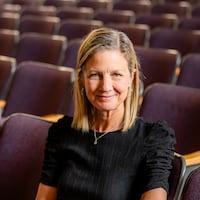U.S. Deputy Secretary of Education Cindy Marten visited three metro Atlanta schools this week as part of its “Raise the Bar: Lead the World” tour. The goal is to highlight successful academic programs, especially ones that focus on science, technology, engineering and math (STEM).
Marten stopped by the Coretta Scott King Young Women’s Leadership Academy in Atlanta Public Schools on Wednesday, where she observed classes in public health, Japanese, and interactive media. Students showed her their projects and research assignments, from creating their own apps to building a model of a biome — a community of plants and wildlife that share similar environmental needs. She visited two Gwinnett County schools on Thursday.
The Atlanta Journal-Constitution spoke to Marten about her time in the Atlanta area. The interview has been edited for length and clarity.
Q: What have you learned from your visit?
A: Being able to see the students learning in the classrooms and ... the way (these districts are) leveraging their federal funds to give students the opportunity to learn specifically STEM education is what I’m looking at. And also multilingualism ... to see it live and in action and how the teachers are getting support in their own professional learning, their ability to collaborate with each other, then to plan some really well-designed lessons where kids have what I like to call “hands-on, minds-on learning,” where the kids are actively engaged in their learning.
Q: You spent time talking with students, teachers, school leaders and parents during your visit. Where are the gaps? Is there anything schools should be doing that they’re not?
A: Part of (this initiative) is being globally competitive. That happens when you have clear pathways to multilingualism and you have career-connected learning. And it’s all kind of based in STEM education. I think one of the things that is also important to highlight ... is connecting with industry. Industry is saying, “We need more students prepared for the jobs that are coming our way,” and getting businesses’ voices at the table to design school programming that works from a business perspective.
Credit: Miguel Martinez
Credit: Miguel Martinez
Q: Research shows there’s a lack of diversity in STEM fields. There’s a need for more women and people of color. What can be done to find more balance?
A: Getting all of the key organizations, school system leaders, board superintendents, state-level leaders to understand it’s a business proposition more than anything else. You get the employers telling us when they hire a more diverse workforce, they get better economic outcomes. So it’s a value proposition from a business perspective, as much as a proposition from a social services perspective.
Credit: Miguel Martinez
Credit: Miguel Martinez
Q: What’s next? What will you do with the information you’ve learned here?
A: What I saw (here) is very doable in any city in any state across the country. So I’m lifting up examples, “bright spotting,” you may call it, where it’s already being done. And people can lean in on that and say, “Oh, we could do a coding lab for K-3,” “We can have third through fifth graders doing these six different kinds of coding programs.” So our job is to go and “bright spot” it and then amplify it across the country so people can learn from one another.
About the Author
Keep Reading
The Latest
Featured


